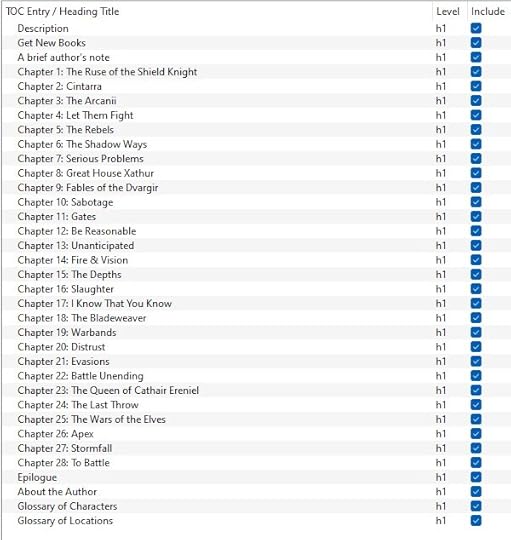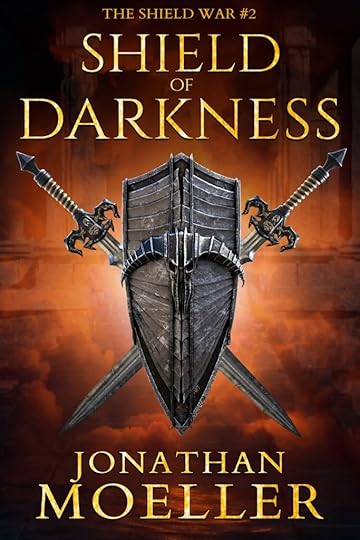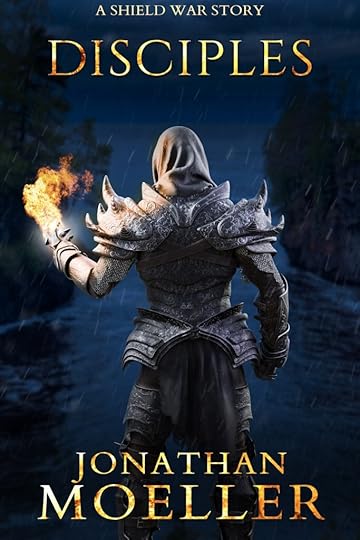Jonathan Moeller's Blog, page 35
July 15, 2024
The Pulp Writer Show, Episode 209: 5 Tips For Vivid Characterization
In this week’s episode, I discuss five tips for creating distinctive character voices in your novel.
You can listen to the show with transcript at the official Pulp Writer Show site, and you can also listen to it at Spotify, Apple Podcasts , Amazon Music, and Libsyn.
-JM
July 12, 2024
5 Tips For Creating Distinctive Character Voice
Today I thought I would talk about how to create distinctive voices for characters in a novel.
The DRAGONSKULLL series was mostly a single POV throughout all nine books. Gareth Arban was the main character, and though we started to have more POV characters come in during the final third of the series, Gareth was still the main character and had the most scenes.
By contrast, SHIELD OF STORMS and the rest of THE SHIELD WAR series is going to be multi-POV. Ridmark Arban, Niara, Lika, and Nikomedes are going to be the main characters for the bulk of the series, and the POV of the different chapters will rotate between them. I’m writing it in what’s called “limited third person” where you shift entirely to one person’s perspective for a scene or chapter. For example, if I’m writing from Ridmark’s perspective, we’ll see things from Ridmark’s perspective and know what he’s thinking. “Omniscient third person”, by contrast, is where the author jumps from person to person – for example, in a scene with both Ridmark and Nikomedes, the author will let us know what they both are thinking and we’ll see things through both their eyes. There’s nothing wrong with this, and a skillful writer can do it quite well, but it’s generally easier to write in third-person limited.
Of course, third-person limited is only easier if you can make each POV distinctive. You have to write a distinctive voice for each character, and it become a problem if the characters all sound and think the same way.
So how can you create a distinctive voice for each POV character.
There are a couple of different ways that you can do this.
1.) Descriptions.
When writing from a particular character’s viewpoint in limited third person, obviously that character will things through his for her own personal lens, and that his a handy way to differentiate characters.
For example, take the laptop I am using to write this. I got it in the summer of 2023 when my previous laptop went to the Big Recycling Center In The Sky, and it’s an HP Envy 17 with a 17-inch screen, since I’m at a phase of life where I prefer to write with the Microsoft Word window maximized and the size zoomed way up.  But someone who knows less about computers than I do wouldn’t see “HP Envy”, they would just see “silver laptop with a big screen.” Or someone who only uses Mac laptops would just see it as a big chunky PC laptop, and would think of it that way.
But someone who knows less about computers than I do wouldn’t see “HP Envy”, they would just see “silver laptop with a big screen.” Or someone who only uses Mac laptops would just see it as a big chunky PC laptop, and would think of it that way.
Firearms are another good example of this. For example, according to the FBI website, the official sidearm of an FBI agent is a Glock 19M semiautomatic pistol, which holds 15 rounds of 9mm ammunition. But many people would not know this – they would see the weapon and just think of it as “a black handgun” or a “black pistol”, or may even describe it inaccurately, calling it a revolver or a machine gun.
This variation in description would also extend to characters. Consider a woman who works a school administrator. The school board chairman might think of her as the most reliable employee in the district and describe her that way. The students might describe her as “the mean lady who works in the office.” One of the teachers might think of her as “my best friend.” Another teacher might think of her as “my brother’s nasty ex-wife.” Which one of these characterizations of the woman are correct? Well, it depends on the particular POV at the moment, and you can use description to help differentiate your characters from one another.
2.) Dialogue
Dialogue is another great way to differentiate characters from one another, since no two people ever really have similar speech patterns. The school administrator in the previous example might always find a way to bring the conversation back around to her cats. A socially awkward computer programmer might start oversharing facts about topics that interest him. A taciturn electrician might speak only when necessary and prefer silence the rest of the time. A lawyer might talk in very precise sentences with every word exactly measured, especially a lawyer who is used to arguing in front of a judge. (A common joke is that rather than asking “why”, a lawyer will always say “on what basis?”)
People will also talk about different things. They have favorite topics, or are better or worse at handling emotionally sensitive discussions. People also have things they absolutely refuse to discuss under any circumstances and become angry if forced to talk about them.
Dialogue is also a place where it’s best not to get too hung up on grammar, since you’ll find that most people do not talk in grammatically perfect sentences. People often repeat themselves, respond to a question with another question or an irrelevant answer, and go off on tangents. The trick for writing dialogue is to try and catch a feeling of verisimilitude without getting too bogged down in trying to make it too realistic. You want to keep moving the story forward, after all.
3.) Attitudes
Another good way to differentiate between POV characters is attitude. How do they respond to things emotionally?
This ties into description, but a character’s attitude will obviously influence how they describe things. To return to the example of the school administrator above, a student with a cranky attitude might think of her as “the mean lady in the office,” while a teacher who is in a good mood and enjoys his or her work might think of her as “Ms. Jones from the school district.” The character’s mood will color how they describe their surroundings and how they relate to the characters around them. A character who is in a good mood would simply note a a car braking in front of them in traffic and slow down. A character in a bad mood will likely rant about how the jerk in front brake-checked them.
This leads into the next aspect of character attitudes – how does a character react emotionally to events and other characters? One character might view having to stand in line for a while as a minor inconvenience, and turn his or her thoughts elsewhere during the wait. Another character might fly into a rage with impatience and demand to speak to the manager. Or the first character might dislike going to restaurants because he or she finds it embarrassing to be waited upon, and will get through the experience with stiff politeness. The second character might love going to restaurants, and make all sorts of unreasonable demands upon the waiter.
Character attitudes and how they emotionally react to situations and each other is an excellent way to differentiate characters.
4.) Knowledge
Another good way to distinguish between characters is their individual knowledge, and can also help inform the descriptions.
During a recent road trip, I was listening to the audiobook of DARK ANGEL by John Sandford. In the book, two federal agents, Letty Davenport and Rod Baxter, are assigned to infiltrate a group of dangerous hackers. Letty is an expert on firearms and violence and very physically fit, while Baxter is sixty pounds overweight but an expert all aspects of hacking and computer crime. He doesn’t know anything about guns, but he knows everything about breaking into computer systems. Whereas Letty has only a surface-level grasp of computer crime – she knows what a ransomware attack is, but nothing about how to actually execute one.
This is a helpful way to distinguish between characters’ POV scenes. One character might see a firearm and think of it as a black rifle, while a character with greater knowledge of guns would immediately identify it as an M-16A2. Another character might see a van and just think of it as an “old red van”, but a character who works as a mechanic would identify it as a 1993 Ford Aerostar.
5.) Subtext
Now we come to the great bane and hindrance of human communication – subtext!
How characters react to subtext – whether they notice it, imagine it, or fail to detect it at all, can help distinguish between character POVs and help create character voice.
In this context, “subtext” refers to an additional implied meaning beyond the actual literal meaning of the words. For example, a woman tells her boyfriend that she hears that the Grand Canyon is nice in May. The subtext is that she wants him to plan a trip for them to the Grand Canyon, and the boyfriend may or may not pick up on this subtext. (Communication failure of this sort are a common staple of sitcom plots, where many conflicts could be resolved if the participants were capable of communicating clearly.)
That’s something of a cliched example, but we’ve all had examples in Real Life where we said something only to have our words misinterpreted. Like, you say “I don’t like fish” and the person to whom you are speaking interprets that as “I hate your cooking.” That might not have been your meaning at all, but the comment was interpreted that way. Or an office manager observes that there are budget cuts, and his employees immediately interpret that as impending layoffs, when in fact the manager simply meant that the budget for office supplies has been cut.
So subtext provides an excellent tool for distinguishing between characters – one character might completely miss subtext in conversations, one who imagines subtexts that aren’t there, or one who constantly speaks in subtext and gets annoyed when people don’t pick up on it.
Hopefully these five tips will help you craft characters with distinctive voices and viewpoints.
-JM
July 11, 2024
HALF-ORC PALADIN underway!
Now that SHIELD OF DARKNESS is out, what is next?
I am now writing HALF-ORC PALADIN, which will be the third book in my HALF-ELVEN THIEF series. (I’m planning for six in that series.) I’ve been working on it on the side long enough that I’m actually over halfway through the rough draft already, putting me on Chapter 9 of 16. Though like SHIELD OF DARKNESS, some of the chapters are long enough that I’ll have to split them up in editing.
If all goes well, HALF-ORC PALADIN should be out in early-ish August.
After HALF-ORC PALADIN, I’m not 100% sure what I’m going to do next – it’s either going to be SHIELD OF CONQUEST, CLOAK OF ILLUSION, or GHOST IN THE TOMBS. I’m 20,000 words into GHOST IN THE TOMBS, so I might just go right into that once HALF-ORC PALADIN is finished, but we’ll see.
-JM
July 10, 2024
Question of the week: sandwiches!
It’s time for Question of the Week, which is designed to inspire interesting discussion of enjoyable topics.
This week’s question: what is your favorite kind of sandwich?
No wrong answers, obviously.
For myself, I think it would be a sub with roast beef, ham, lettuce, pickles, tomatoes, and a significant quantity of spicy mustard.
The inspiration for this question is that it’s lunchtime and I’m hungry. 
-JM
SHIELD OF DARKNESS now available!
“They would cross the Deeps, invade the Isle of Kordain, and then either they would prevail against the Exarch or they would be dead. That would be that. Simple.”
I am pleased to report that SHIELD OF DARKNESS is now available at Amazon US, Amazon UK, Amazon DE, Amazon CA, Amazon AU, Barnes and Noble, Kobo, Google Play, Apple Books, Payhip, and Smashwords.
War is coming between the Shield Knight and the Exarch. But neither sees the dark power manipulating the battle from the shadows.
To drive the Exarch from her stronghold on the Isle of Kordain, Ridmark is gambling on a bold strategy – to reach the Isle through the twisting caverns of the Deeps.
But the caverns of the Deeps are filled with deadly dangers and deeper mysteries.
And disturbing one of those mysteries might wake a darkness to dwarf even the Exarch herself…
-JM
July 9, 2024
The Pulp Writer Show, Episode 208: 6 Tips For Working With Audiobook Narrators
In this week’s episode, I look at six ways indie authors can effectively work with audiobook narrators to produce great audiobooks.
You can listen to the show with transcript at the official Pulp Writer Show site, and you can also listen to it at Spotify, Apple Podcasts , Amazon Music, and Libsyn.
-JM
July 5, 2024
sign up for my newsletter and get a free short story!
SHIELD OF DARKNESS is on track to come out next week!
This makes it an excellent time to sign up for my new-release newsletter! If you sign up for my newsletter, when SHIELD OF DARKNESS comes out you’ll get a free ebook copy of the short story DISCIPLES.
-JM
July 3, 2024
Question of the week: Internet Outage!
It’s time for Question of the Week, which is designed to inspire interesting discussion of enjoyable topics.
This week’s topic – your home Internet goes out, which means you can’t use the Internet until the ISP gets around to fixing it. What do you do instead?
I realized that the question breaks down into two ways – if the Internet goes down while I’m working, or if the Internet goes down while I want to relax.
If the Internet goes down while I’m working, it’s not necessarily a huge deal. If I’m writing or editing, everything is downloaded locally. So I would just keep on writing and editing until the Internet came back up. If the Internet goes down while I’m in the middle of, say, uploading an ebook or an audiobook or setting up ads or changing my website, that is in fact super annoying. However, I usually work on multiple books at a time – right now I’m working on SHIELD OF DARKNESS, HALF-ORC PALADIN, and GHOST IN THE TOMBS. So if I’m working on an online task and the Internet goes out, then I’ll switch to one of the books I’m currently working on and make progress with that.
If the Internet goes down while I want to relax, I’ll read a paper book (I still have lots of those!) or watch a DVD. When OPPENHEIMER came out on Blu-Ray, Christopher Nolan rather famously said that you should get it on Blu-Ray so no evil streaming service could take it away. Obviously he had a financial motive for that statement, but he wasn’t wrong. So if there’s a movie I really like, I will attempt to get it on DVD or Blu-Ray.
The inspiration for this question was that I wanted to play STARFIELD, but the Xbox network services were down, and I didn’t feel like digging through the settings to get offline mode to work. So I wrote this blog post instead. 
-JM
July 2, 2024
The Pulp Writer Show, Episode 207: 7 Mindset Tips For Writers
In this week’s episode, we take a look at seven attitude shifts for writers that will make them happier and more productive. You can listen to the show with transcript at the official Pulp Writer Show site, and you can also listen to it at Spotify, Apple Podcasts , Amazon Music, and Libsyn.
-JM
July 1, 2024
SHIELD OF DARKNESS Table of Contents
A new month is upon us, and I am pleased to report that I am finally far enough along with SHIELD OF DARKNESS to share the Table of Contents, which you can see below!
If all goes well and nothing weird happens (a dangerous assumption nowadays), then the book should be out next week.

-JM





